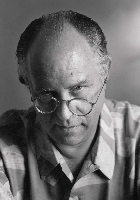Bill Zavatsky
Bill Zavatsky Poems
Shadow of a bee zig-zagging through the grass,
then the apparition of the bee itself, whirling around me
the way, a moment ago, uncapping my pen to write,
three crazed sparrows flew above my head, chirping,
...
How bad can it be
this wacky New York City
with the first twelve lines
...
Bill Zavatsky Biography
Bill Zavatsky (born 1943 Bridgeport, Connecticut) is an American poet, journalist, jazz pianist, and translator.[1] Zavatsky could be described as a second-generation New York School poet, influenced by such writers as Frank O'Hara and Kenneth Koch. (Koch was his professor at Columbia University.) In addition to the wry humor typical of the New York School, Zavatsky adds to his poetry an emotional poignancy that gives it additional depth. Zavatsky grew up in a working-class family in Bridgeport, Connecticut. His father was a mechanic who owned a garage. Zavatsky was the first member of his family to graduate from a four-year college.[citation needed] He attended Columbia University, where his fellow students included a dynamic cohort of budding writers, such as Phillip Lopate, Ron Padgett, and David Shapiro. His artistic influences include the jazz pianist Bill Evans, whom Zavatsky got to know late in the musician's career.[citation needed] Zavatsky has eloquently eulogized Evans, both in the liner notes to his albums, and in his poem "Live at the Village Vanguard." Like some of his predecessors in the New York School, Zavatsky also excels as a translator of poetry. His work in this area has included English versions of the writers André Breton, Valery Larbaud, Robert Desnos, and Ramón Gómez de la Serna. His co-translation of André Breton's Earthlight received the PEN Translation Prize. Zavatsky has worked as a journalist; his articles have appeared in The New York Times Book Review and Rolling Stone. He was editor-in-chief of SUN press and SUN magazine. He has taught workshops for Teachers & Writers Collaborative, Long Island University, and University of Texas-Austin For many years he taught English at Trinity School in New York City, where his students frequently won creative writing awards. Zavatsky lives in New York City.)
The Best Poem Of Bill Zavatsky
Baseball
We were only farm team
not "good enough" to
make big Little League
with its classic uniforms
deep lettered hats.
But our coach said
we were just as good
maybe better
so we played
the Little League champs
in our tee shirts
and soft purple caps.
What happened that afternoon
I can't remember—
if we won or tied.
But in my mind
I lean back
to a popup hanging
in a sunny sky
stopped
nailed to the blue
losing itself in a cloud
over second base
where I stood waiting.
Ray Michaud who knew
my up-and-down career
as a local player
my moments of graceful genius
my unpredictable ineptness
screamed arrows at me
from the dugout
where he waited to bat—
"He's gonna drop it! He
don't know how to catch,
you watch it drop!"
The ball kept lifting
higher, a black dot
no rules of gravity, no
brakes, a period searching
for a sentence, and the sentence read:
"You're no good Bill
you won't catch this one now
you know you never will."
I watched myself looking up
and felt my body rust
in pieces to the ground
a baby trying to stand up
an ant in the shadow of a house
I wasn't there
had never been born
would stand there forever
a statue squinting up
pointed out laughed at
for a thousand years
teammates dead, forgotten
bones of anyone who played baseball
forgotten
baseball forgotten, played no more
played by robots on electric fields
who never missed
or cried in their own sweat
I'm thirty one years old.
The game was over twenty years ago.
All I remember of that afternoon
when the ball came down
is that I caught it.

Help me